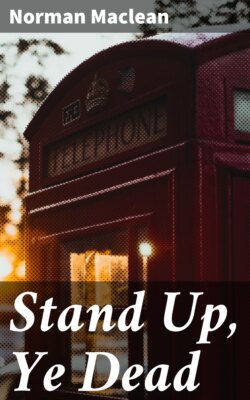Читать книгу Stand Up, Ye Dead - Norman Maclean - Страница 18
На сайте Литреса книга снята с продажи.
V
ОглавлениеBut it might have been worse with the race than it is even to-day, for this obsession of racial suicide might have possessed the nation sooner than it did; and if it had, then we would truly have been poor indeed. For Sir Walter Scott was the seventh child of his parents; and it is as certain as most human surmisings, that if the ideal of life which to-day dominates the professional classes in Scotland, had, in the year 1771, found sway in the College Wynd of Edinburgh, Walter Scott would never have been born. John Wesley was one of nineteen children: fortunately for the race, the gospel of the salvation of men through racial limitation had not yet gained devotees in that vicarage where the children were taught to cry quietly! Alfred Tennyson was the third of seven sons, and if yesterday were as to-day, then 'In Memoriam' would never have been written. But now, alas! the door is shut against the Walter Scotts and Wesleys of the future.
It is unnecessary to multiply instances. Any one can see how impoverished the race would have been, and how different the history of the world, if the door by which mighty souls become incarnate had been shut by the generations of the past. One has but to think of the world with Luther, Knox, Carlyle, and the prophets shut out. In France to-day Napoleon would never have been born! We can already trace the tracks of the withering blight that has seared humanity. In Germany idealism is dead, and there is no prophet either of Christian love or of self-sacrifice. France trampled upon the Church because the Church fought resolutely against the policy of racial suicide and used all its power to save the womanhood of France from submitting to degeneration. Because the Church persisted, France 'extinguished the light of heaven,' and no man was found who could rouse the nation to realise its sin and to repent. The prophet who could have done so was doubtless shut out. And among ourselves we can mark the slow ebbing of vision, of genius, and of prophetic might. Two generations ago one voice could rouse the whole nation and kindle the fire of fierce indignation against the tale of Balkan atrocities. In our day we beheld the Armenians massacred again and again; but there was no voice to rouse the nation to indignation or to action. We could not send the fleet to the mountains of Ararat, declared our statesmen, and we acquiesced. One by one the great leaders, the poets, the writers passed into the silence, and the day of the politician and the time-server had come. Did a prophet arise, we no longer stoned him; we only meted out to him contumely and neglect. In vain did Lord Roberts summon a nation sinking on its lees to arise and quit themselves like men. When the judgment throne of God blazed forth in the heavens, and our startled eyes beheld the sword emerge from the mists that hid heaven from our eyes, we were engaged in preparations for civil war, and listening to the low murmur of the toiling masses who threatened social chaos. And there was no man found equal to the task of saving us from ourselves. The men who could have saved us were, doubtless, shut out. It is manifest that the richest elements must be lost to any race that limits its own growth. If the sixth and seventh children in a family be the healthiest, as has been established by investigation,[4] then there is no place for the strongest in a family limited to two! Thus it comes that we are left to-day without a Wesley who could kindle the passion of righteousness in the nation's soul; without a Scott who could glorify our patriotism; and without a Tennyson who could set the hearts athrob. We have as yet produced neither a Pitt nor a Wellington. They have been shut out. That is our impoverishment. For great souls will no longer come aboard a world such as this.
